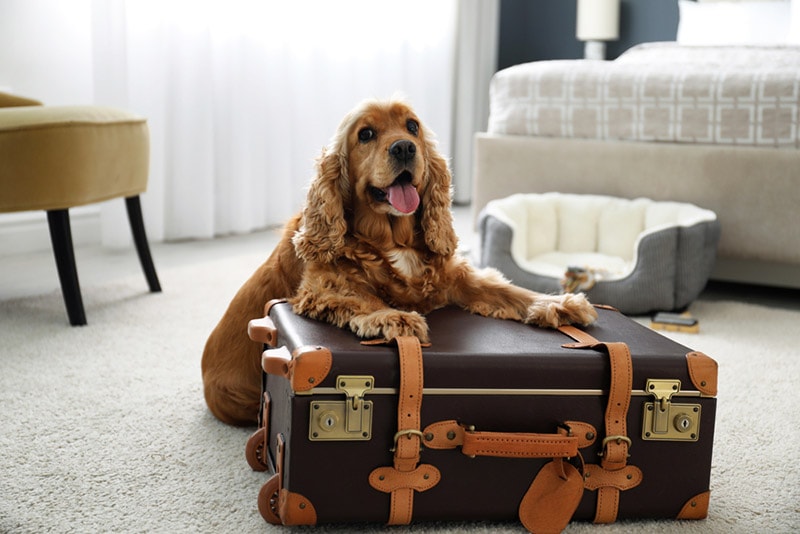Cane Corso vs German Shepherd: Which One Is Right for Me?

Updated on
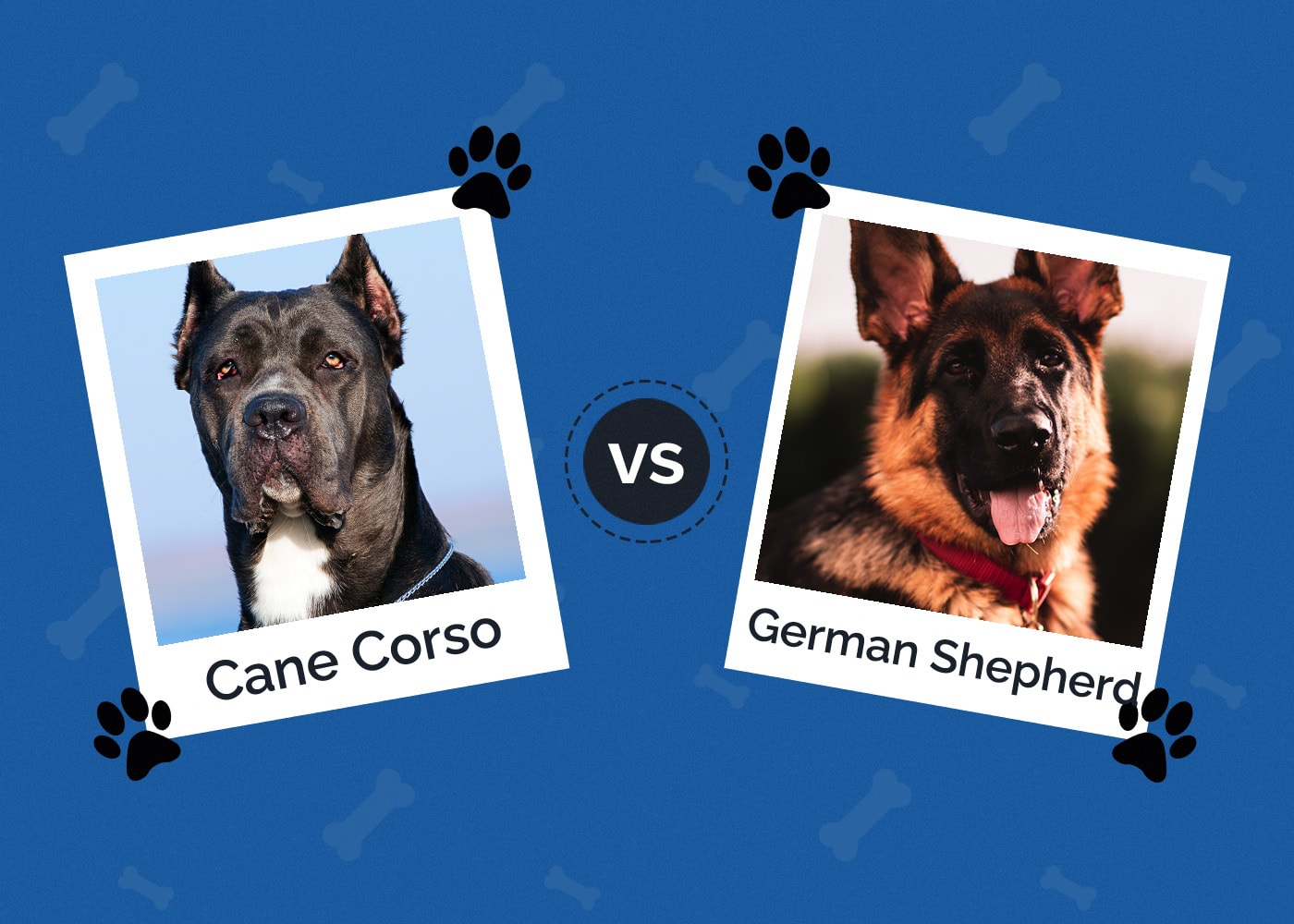
Cane Corsos and German Shepherds are both very regal, intelligent, and protective dogs. They are both very popular for many of the same reasons. But which dog is better? Is a German Shepherd or a Cane Corso right for you? The answer to these questions will depend on some nuances between these two dog breeds. This guide will cover everything you need to know about Cane Corsos and German Shepherds so you can make an educated decision about which breed is better suited for you and your lifestyle.
Visual Differences
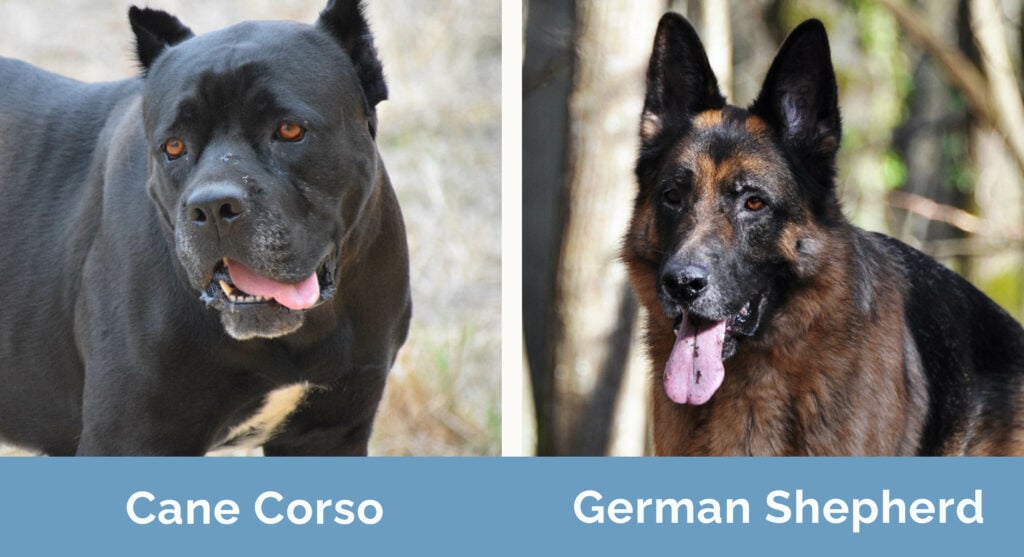
At a Glance
- Average height (adult): 23–27 inches
- Average weight (adult): 88–110 lbs.
- Lifespan: 9–12 years
- Exercise: High intensity
- Grooming needs: Low
- Family-friendly: Yes
- Other pet-friendly: Sometimes
- Trainability: Eager to please, ready to learn; must be trained from a young age
- Average height (adult): 22–26 inches
- Average weight (adult): 50–90 lbs.
- Lifespan: 7–10 years
- Exercise: High intensity
- Grooming needs: Brushing required
- Family-friendly: Yes
- Other pet-friendly: Sometimes
- Trainability: Very smart, enjoys mental stimulation, thrives on extensive training
 Cane Corso Overview
Cane Corso Overview
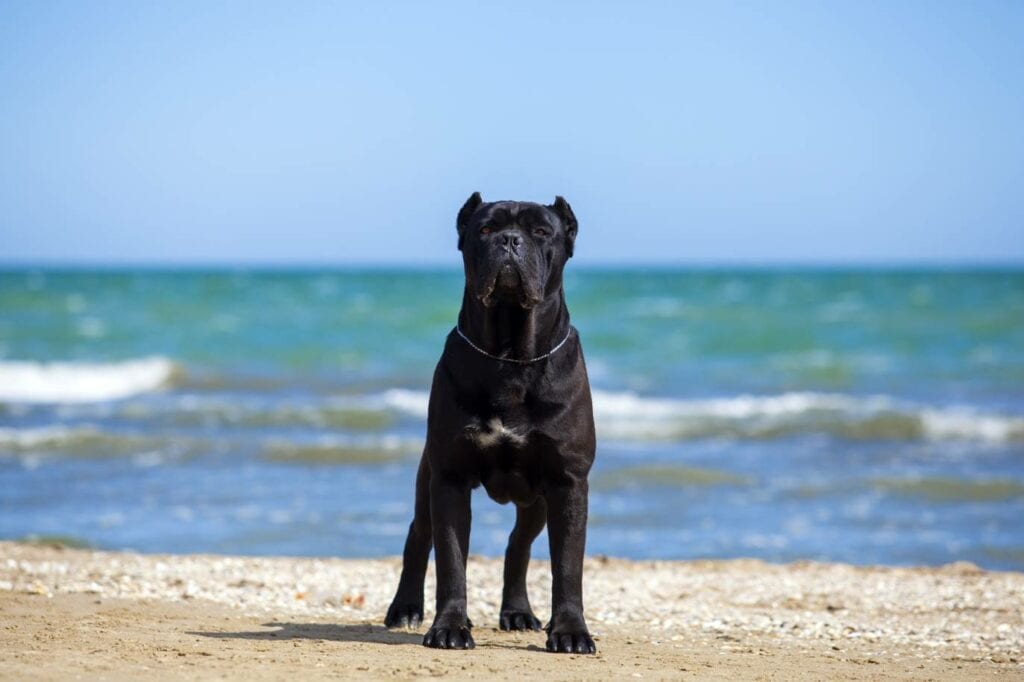
Cane Corsos are very large and protective dogs. This breed has roots going all the way back to Ancient Rome. For centuries, Cane Corsos have been bred for their large size, loyal character, and intimidating appearance. Cane Corsos make for excellent guard dogs and protectors. They become very attached to their owners and, in some cases, will defend them with their lives.
Character & Temperament
Cane Corso’s temperament is marked by deep levels of loyalty, protectiveness, and affection. Cane Corsos are extremely loving towards their owners and their families. They are snuggly and love to spend time in physical activity with the people they are bonded to. However, Cane Corsos can be stand-offish with strangers and other dogs. Cane Corsos can bark at people they don’t know and even act aggressively. That makes them great guard dogs and home protectors but might not make them great for extended outings or socialization with strangers.
Health
Cane Corsos are typically healthy dogs, but, like all purebreds, they do have some recurring health issues to be aware of. Responsible breeders should screen for serious health issues during the breeding process, but not all breeders do this. The most common health issues associated with Cane Corsos are hip and elbow dysplasia as well as persistent demodex mange. Cane Corsos are large dogs, so they are at increased risk of heart failure and bloat, both of which can be fatal if left untreated. Despite that, Cane Corsos actually have a very solid lifespan for a large dog and can live to be 12 years old in a good home.
Training
Cane Corsos are very trainable, but they are most easily trained from puppies. Due to their large size and protective behaviors, it is necessary to train your Cane Corso as a puppy. These dogs must be socialized with other people, other pets, and other dogs from a very young age. Not training your Cane Corso as a puppy can lead to aggressive behaviors later in life. Since these dogs are so large and muscular, it can be very difficult to control them in a situation if they start to misbehave.
The good news is that Cane Corsos are generally eager to please, which makes them easy to train. But the earlier you start, the better the results. If you do not properly socialize a Cane Corso, it is often better to keep them at home where they feel safe and comfortable.
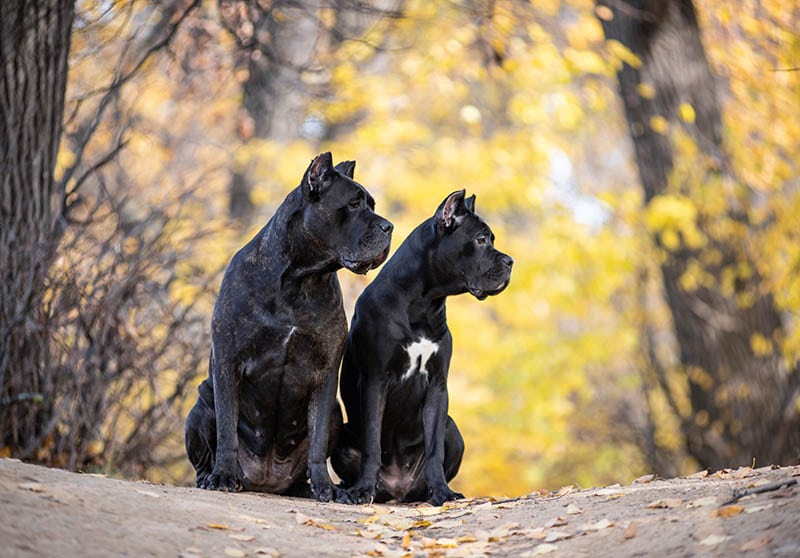
Suitable for:
Cane Corsos are suitable for people that want a large protective dog. A Cane Corso owner has to be willing to socialize their dog extensively and physically exert them to get their energy out. If you are not willing to put in the work to socialize a large dog, you could end up with an unruly canine that can be hard to manage, especially if you have a larger version. If you can put in the work, a Cane Corso can be a loyal companion for 10 years or more.
German Shepherd Overview
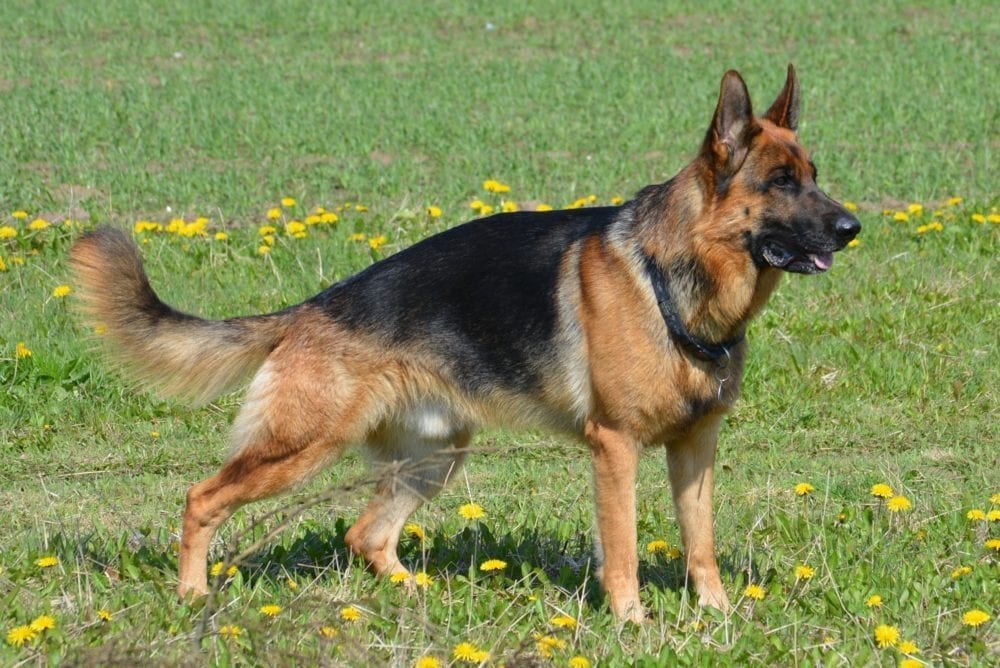
German Shepherds are one of the most popular dog breeds in the United States. People adore their regal appearance, intelligence, and loyalty. German Shepherds were bred as all-around working dogs and can still be found working in a large variety of different roles, from sniffing dogs to chasing dogs and inspection dogs. German Shepherds can also make for great family dogs, but they require lots of exercise and training in order to be good dogs in the long run. German Shepherds will bond with a family and become extremely intelligent and loyal protectors.
Character & Temperament
The American Kennel Club describes German Shepherds as “loyal, confident, courageous, and steady.” These character traits have made German Shepherds a popular dog breed for generations. German Shepherds are extremely intelligent, intuitive, loyal, and protective. Well-trained German Shepherds have a very even temperament, and they are always looking for the next cue or command before acting. Some German Shepherds can suffer from anxiety, usually stemming from poor socialization, which can manifest as aggressive behavior. These negative traits can usually be reduced or eliminated with proper training.
Health
Purebred German Shepherds come with some serious health issues to be aware of. Many purebred German Shepherds suffer from severe degenerative myelopathy, elbow dysplasia, and hip dysplasia. These issues are very common, and potential owners must be aware of these problems before investing in a German Shepherd. These health issues can require constant and attentive medical attention to stem the worst effects. Good breeders should be screening for these problems, but the breed is so common, and these health issues are so pervasive, that even the best breeders can still provide dogs with a high instance of these problems.
Training
German Shepherds are extremely intelligent and have the ability to undergo extensive training. German Shepherds can learn a large number of words and commands, making them easy to train. A well-trained German Shepherd can be a lifelong companion that is very well-behaved. Training is most effective when it is done at a young age. German Shepherds can have aggressive tendencies, so socializing them when they are small and easy to manage is imperative to long-term success. Well-trained German Shepherds are great family dogs that are good with small children and other dogs, but those behavior traits are predicated upon thorough socialization and at least rudimentary training.
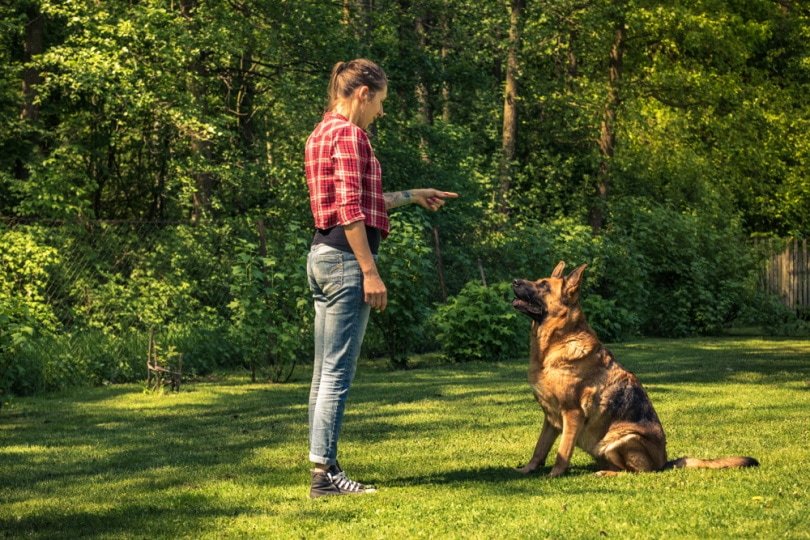
Suitable for:
German Shepherds can make for ideal family dogs. German Shepherds are very loyal and can be trained for a variety of different jobs. Properly socialized German Shepherds are protective and loyal and can be fantastic with families of all sizes. People looking for a dog they can heavily train or use for work or competitive purposes will also find a lot to like in a German Shepherd. German Shepherds are perfect for people looking for an all-around good dog with many strengths and a wide variety of different training avenues.
Key Differences
Size
Cane Corsos are generally larger dogs than German Shepherds. German Shepherds are leaner and smaller than Cane Corsos. Cane Corsos are very stocky, heavy, and muscular. If you are looking for a larger dog, you will lean more towards a Cane Corso than a German Shepherd.
Grooming
Cane Corsos require less grooming than a German Shepherd. German Shepherds have a long double coat that requires frequent brushing to keep it sleek. Cane Corsos have a naturally short coat that sticks close to the body without any brushing or grooming required. German Shepherds shed more than Cane Corsos.
Temperament
German Shepherds and Cane Corsos have very similar temperaments. Both are very intelligent dogs with a high ceiling for training. Cane Corsos are a little more protective and aggressive than German Shepherds. German Shepherds can learn more words and commands, which can make them easier to keep in line when out and about. If you want a versatile dog, you will want to go with a German Shepherd. If you want a more protective dog that will work best as a protector or a guard dog, you will want to go with a Cane Corso.
Which Breed Is Right for You?
Cane Corsos and German Shepherds are very similar in many ways. These dogs will appeal to many of the same people. The breed that is right for you will depend on three key factors. What do you want to do with your dog? How many people live in your house? How big of a dog do you want? If you want a snuggly dog that makes you feel safe and secure, you will likely rather have a Cane Corso. If you want a versatile dog that can go out with you or perform jobs, you will want a German Shepherd.
If you have a large busy household with other dogs and kids, you might want a German Shepherd. If you live alone or have a quiet, more stable home, you will probably benefit more from a Cane Corso. Lastly, if you want a large dog, you will want to stick with a Cane Corso. The smallest Cane Corsos are generally the same size as the largest German Shepherds. If you want a smaller dog, you will likely consider a German Shepherd.
Overall, both of these dogs are very similar, and the final choice will be up to you. Both dogs can be amazing and excel with proper training and socialization.
Featured Image Credit: (L) Sbolotova, Shutterstock | (R) Alexander Naglestad, Unsplash

 Cane Corso Overview
Cane Corso Overview




